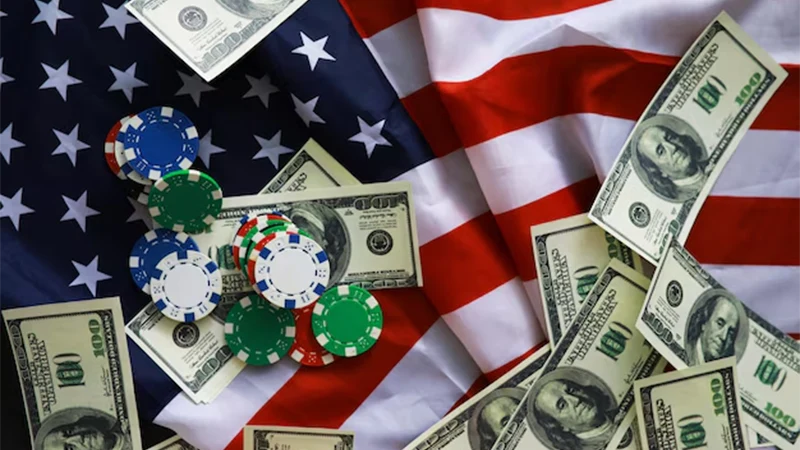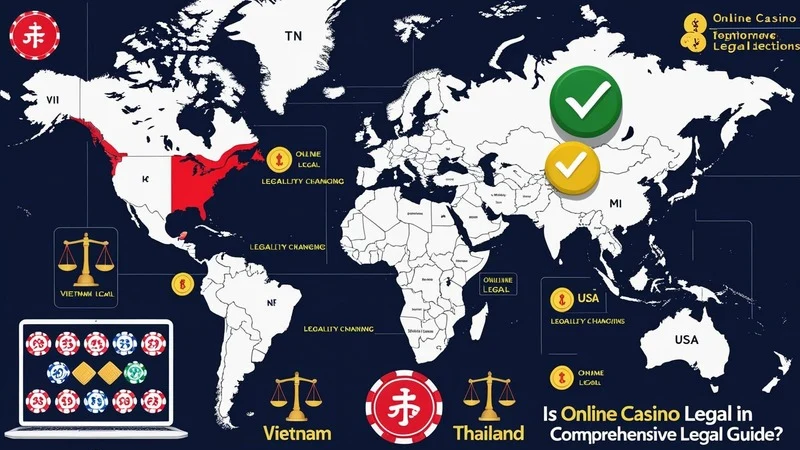Online casinos are experiencing rapid growth across Southeast Asia and globally, with millions of players seeking entertainment and potential winnings through digital gaming platforms. However, the legal landscape surrounding online gambling varies dramatically from country to country, creating confusion for players who want to ensure they’re operating within the law.
The question of legality isn’t straightforward – what’s perfectly legal in one jurisdiction may carry serious penalties in another. This comprehensive guide examines the legal status of online casinos in three key markets: Vietnam, Thailand, and the United States – regions with significant player populations and distinct regulatory approaches. Understanding these legal frameworks is essential for anyone considering online casino participation, as ignorance of local laws is rarely accepted as a valid defense.
Before engaging with any online casino platform, players must thoroughly understand their local regulations, potential risks, and the importance of responsible gaming practices.
Is Online Casino Legal in Vietnam?
Current Regulations in Vietnam
Vietnam maintains strict government control over casino operations, with gambling being illegal and having been for centuries. The Vietnamese government has historically taken a conservative approach to gambling, viewing it as a potential social harm that requires tight regulation.
Under current Vietnamese law, Vietnamese citizens are prohibited from gambling at land-based casinos within the country, with limited exceptions such as the pilot program in Phu Quoc that allows Vietnamese nationals to play under specific conditions. However, casino operators in Vietnam must comply with strict operational guidelines to maintain their licenses, indicating that while physical casinos exist for foreign tourists, the regulatory framework remains restrictive.

For online casinos specifically, Vietnamese law considers participation by Vietnamese citizens to be illegal. The government has not established a legal framework for online casino operations targeting Vietnamese players, and recent enforcement actions demonstrate the authorities’ commitment to maintaining these restrictions. Vietnamese and Lao police have successfully dismantled a major online gambling operation that facilitated illegal bets totaling nearly $50 million, showing active law enforcement against illegal online gambling operations.
Reality of Player Participation and Future Trends
Despite the legal restrictions, the reality on the ground tells a different story. The online gambling market in Vietnam is projected to reach almost $8 million in revenue in 2024 which is four times more than it was in 2017, indicating significant underground participation through international platforms.
Many Vietnamese players continue to access offshore casino platforms, often using VPNs and foreign payment methods to circumvent local restrictions. While the state has not yet developed comprehensive legal pathways for online casino regulation, there are indications that future policy might evolve toward greater openness if proper oversight mechanisms can be established.
The government appears to be balancing traditional conservative values with the recognition that gambling activities are occurring regardless of prohibition, potentially opening doors for regulated frameworks that could provide better consumer protection while generating tax revenue.
Is Online Casino Legal in Thailand?
Thai Law on Gambling
Thailand maintains one of the most restrictive gambling policies in Southeast Asia. Most forms of gambling are illegal under the Gambling Act of 1935, which includes casino-style gaming. However, a few exceptions exist, such as: State-regulated lotteries. Betting on horse races is also state-controlled.
The 1935 Gambling Act forms the backbone of Thailand’s anti-gambling legislation, making virtually all forms of gambling illegal except for state-controlled lotteries and horse racing at designated tracks. Online casinos fall squarely within the prohibited activities, with no legal licensing framework for operators or legal protection for players.

Thai authorities have historically viewed gambling as contrary to Buddhist values and potentially harmful to social stability. The legal penalties for gambling can be severe, including fines and imprisonment, though enforcement has traditionally focused more on operators than individual players.
Current Reality and Government Considerations
Despite strict legal prohibitions, many Thai players access international casino platforms, creating a disconnect between law and practice. The government has recognized this reality and is considering significant policy changes.
Thailand’s cabinet has approved a draft law that would legalise gambling and casinos, a move aimed at boosting tourism, jobs and investment, marking a potentially revolutionary shift in Thai gambling policy. This development suggests that a bill that would legalise casinos in Thailand could be passed in the current government’s term.
The proposed changes focus on integrated resort complexes that would combine casinos with hotels, entertainment, and conference facilities, primarily targeting tourists while potentially allowing controlled access for Thai citizens. However, until such legislation is formally enacted and implemented, online casino participation remains illegal under current Thai law.
Sports Betting vs Casino Games represents another consideration in Thailand’s evolving gambling landscape, as different forms of gambling may face different regulatory treatment in future legislation.
Is Online Casino Legal in the USA?
Federal Law and State Authority
The United States operates under a complex system where federal law sets broad parameters while individual states maintain primary authority over gambling regulation. Unlike many countries with centralized gambling laws, states have adopted diverse policies regarding online gambling. Some, like New Jersey and Pennsylvania, have fully embraced both online casinos and sports betting, while others maintain outright prohibitions.
Federal legislation, including the Unlawful Internet Gambling Enforcement Act (UIGEA) of 2006, doesn’t outright ban online gambling but restricts financial transactions related to illegal gambling activities. The key word is “illegal” – if a state has legalized online casinos, federal law doesn’t prohibit them.
The 2018 Supreme Court decision striking down the federal sports betting ban opened new possibilities for state-level gambling expansion, leading to increased interest in comprehensive online casino legislation across various states.

Legal Online Casino States in America
Online casino games are legal to play in MI, PA, NJ, WV, and CT, representing the current core of legal online casino markets in the United States. These states have developed comprehensive regulatory frameworks that include licensing requirements, player protections, responsible gambling measures, and tax structures.
New Jersey pioneered legal online casino gaming in 2013 and remains the largest market, followed by Pennsylvania and Michigan. Each state maintains its own regulatory approach, licensing requirements, and operational standards, creating a patchwork of different rules and opportunities.
California, Illinois, Indiana, Massachusetts, and New York appear to be considering legalizing online casino gambling as well, indicating potential expansion of legal markets in the near future. However, others like Utah and Hawaii prohibit nearly all forms of gambling, showing the continued diversity in state approaches.
Players in the United States must carefully verify the laws in their specific state, as crossing state lines for online gambling or playing from a state where it’s illegal can create legal complications.
Important Considerations for Players Regardless of Location
Prioritizing Reputable Platforms with International Certification
Regardless of local legal status, players should prioritize platforms that demonstrate legitimate operation through recognized international licensing authorities. Reputable online casinos typically hold licenses from established jurisdictions such as Malta Gaming Authority (MGA), Curacao eGaming, or the Philippine Amusement and Gaming Corporation (PAGCOR).
These licensing bodies impose strict requirements on operators, including regular audits, fair gaming standards, responsible gambling measures, and segregated player funds. Licensed operators typically publish their Return to Player (RTP) percentages, undergo independent testing of their random number generators, and provide clear terms and conditions.
Players should look for casinos that offer responsible gambling tools, including deposit limits, time restrictions, self-exclusion options, and links to problem gambling resources. Transparent operators will clearly display their licensing information, provide accessible customer support, and maintain clear policies regarding player data protection and financial security.

Legal Risk Considerations in Prohibited Jurisdictions
Players in countries where online gambling is prohibited must carefully consider the potential legal consequences of participation. While many international casino platforms remain accessible through various technical means, accessing these services may still violate local laws.
Even when using offshore platforms, players may face legal risks if discovered by local authorities. The use of VPNs, false information, or unofficial payment methods to circumvent local restrictions may create additional legal complications beyond simple gambling violations.
Responsible players should thoroughly research their local laws, understand potential penalties, and make informed decisions about their participation. When in doubt, consulting with legal professionals familiar with local gambling laws can provide clarity about specific risks and circumstances.
Legal Status Varies – Knowledge and Responsibility Are Essential
The legal status of online casinos varies dramatically across jurisdictions, making it impossible to apply universal rules or assumptions. Vietnam and Thailand currently maintain restrictive policies with limited legal gambling options, though both countries show signs of potential future liberalization. The United States operates under a state-by-state system where legal options continue to expand, but remain limited to specific jurisdictions.
Understanding local laws is the essential first step for responsible gambling participation. Players must research their specific legal environment, understand potential risks and consequences, and make informed decisions based on accurate information rather than assumptions or wishful thinking.
The importance of choosing reputable, licensed platforms cannot be overstated, regardless of local legal status. Licensed operators provide better player protections, fair gaming standards, and transparent operations that benefit players even in complex legal environments.
At Casino 91 Club, we operate with full transparency, provide clear information about our licensing and regulatory compliance, and consistently encourage players to understand their local legal requirements before participation. We believe that informed players make better decisions and enjoy safer, more responsible gaming experiences.
Remember: Know the law – play responsibly – stay safe. Legal gambling should always prioritize player protection, fair gaming, and responsible practices that benefit both players and the broader gaming community.

